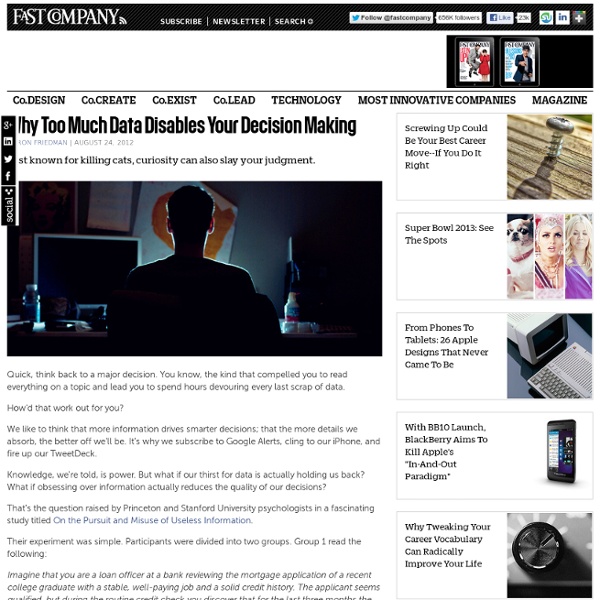Why Too Much Data Disables Your Decision Making

What Successful People Do With The First Hour Of Their Work Day
Remember when you used to have a period at the beginning of every day to think about your schedule, catch up with friends, maybe knock out a few tasks? It was called home room, and it went away after high school. But many successful people schedule themselves a kind of grown-up home room every day. You should too. The first hour of the workday goes a bit differently for Craig Newmark of Craigslist, David Karp of Tumblr, motivational speaker Tony Robbins, career writer (and Fast Company blogger) Brian Tracy, and others, and they’ll tell you it makes a big difference. Don’t Check Your Email for the First Hour. Tumblr founder David Karp will "try hard" not to check his email until 9:30 or 10 a.m., according to an Inc. profile of him. Not all of us can roll into the office whenever our Vespa happens to get us there, but most of us with jobs that don’t require constant on-call awareness can trade e-mail for organization and single-focus work. Gain Awareness, Be Grateful Choose Your Frog
Task & Errand Service By Awesome, Trustworthy People | TaskRabbit
How to run a problem-solving meeting
This is a special sort of get together, similar to the meeting where you organize people to figure out the best way to take advantage of an opportunity. In both cases, amateurs usually run the meetings, and the group often fails to do their best work. Ignore these rules at your peril: Only the minimum number of people should participate. Don't invite anyone for political reasons.
An Economist Explains How Fear Drives Productivity
Here’s a depressing thought: America’s productivity is rising on the backs of scared office workers. That’s essentially the explanation offered by Michael Feroli, chief U.S. economist at JPMorgan (JPM), for the 1.6 percent second-quarter gain reported Aug. 8 by the Labor Department. I asked him if there was anything in the data to suggest worker output was being spurred by improvements in technology or other investments—you know, encouraging stuff. He used a process of elimination to bring me back to earth. Finally, there’s “human capital”—knowledge, skills, etc. The Bureau of Labor Statistics estimates work hours from its Current Employment Statistics survey. The productivity number is calculated by dividing output by hours worked.
Working From Home Makes You More Productive
There are plenty of legitimate reasons to work from home: it saves gasoline (if you drive or take the bus), eliminates commuting time, and on the company side, it means that less office space is needed to accomodate employees. Now there’s another reason, backed by a study (PDF) from Stanford: People who work from home are more productive than those that don’t. The latest telecommuting talking point comes from a study that randomized 250 call center employees at a Chinese company, designating some as telecommuters for four days a week and asking others to come into the office every workday for a nine-month period. The reasoning: the company, CTrip (China’s biggest travel agency), was considering a company-wide work from home policy to decrease high attrition rates and cut down on office costs. As a result of the experiment, CTrip decided to roll out a company-wide work from home program.
Mural.ly
Basic Excel Tricks And Shortcuts
Related:
Related:



